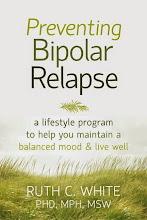The list of symptoms for bipolar disorder as it appears in
the DSM IV states that people with bipolar disorder are more likely to have
problems sleeping and lack of sleep is both a cause and a symptom of bipolar
disorder symptoms. Sleeplessness is a symptom of mania and although feeling
tired is a symptom of depression, so are changes in sleep, which might result
in sleeplessness or in sleeping too much. Not being able to sleep is also
symptomatic of a mixed bipolar state.
Before or early in a bipolar episode you may experience a
change in your sleep patterns, whether in quantity of hours, or the quality of
your sleep – not feeling rested or frequent waking – that allow you to make the
changes necessary to prevent an episode or mediate its length and severity
through changes in behaviors that influence sleep. Being aware of these changes
and recording them and the behaviors that accompany them will help you and your
healthcare provider take the necessary steps to bypass an episode.
Once bipolar disorder has been treated people are less
likely to have sleep problems. Having insufficient sleep can cause hypomania, depression and mania. Sleep
loss is also a symptom of depression, mania and hypomania and thus is a
significant issue for mental well-being that should be monitored by people
living with bipolar disorder. Even if you need medications to sleep you can have a better quality sleep by taking the following steps which may even help you reduce your reliance on sleep medications.
- Develop a sleep routine to keep your circadian rhythms in order. This means going to bed and waking, and taking any medications at the same time every day, including weekends. This gets your body in a pattern of knowing when to feel sleepy and when to wake and allows you to get the amount of sleep your body needs for you to feel rested in the morning with the energy you need for your day.
- Sleep in a cool, dark, quiet room on a comfortable bed. If there are lights or noises that annoy you then sleep with an eyeshade and/or earplugs. Or perhaps you want the soothing noise of a particular sound or music collection. Make sure your bed, pillow and linens are comfortable.
- Exercise regularly to give your body a reason to be tired. Complete your exercise at least 2 hours before bedtime so that your body is not overheated or have an elevated heartrate near bedtime
- Avoid caffeine, nicotine and alcohol. Caffeine and nicotine are stimulants and alcohol may help you fall asleep but interferes with sleep patterns to make your sleep less restful.
- Relax before going to bed. Do relaxing activities before going to bed such as meditation or reading or knitting and avoid doing anything in bed but sleep and intimacy.
Monitoring your sleep patterns may help you know what factors are helping you sleep and what factors are keeping you from a good night's rest. For a sleep log: § http://www.helpguide.org/life/pdfs/sleep_diary.pdf
Other sleep resources:
'Sleep Matters: The Impact of Sleep on Health and Well-Being'
which is downloadable from http://www.mentalhealth.org.uk/publications/sleep-report/.
'Your Guide
to Healthy Sleep' and it is available free at http://www.nhlbi.nih.gov/health/public/sleep/healthysleepfs.pdf.
National Sleep Foundation (www.sleepfoundation.org)
American
Academy of Sleep Medicine (http://www.sleepeducation.com/)




